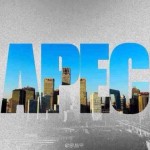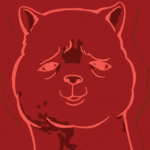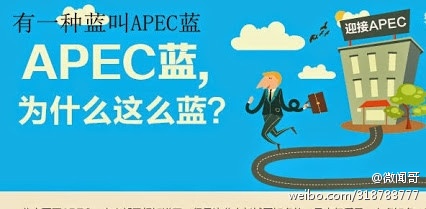Word of the Week comes from the Grass-Mud Horse Lexicon, a glossary of terms created by Chinese netizens and encountered in online political discussions. These are the words of China’s online “resistance discourse,” used to mock and subvert the official language around censorship and political correctness.

(Luo Changping/FreeWeibo)
The color of the skies over Beijing during the Asia Pacific Economic Cooperation (APEC) summit in November 2014. In an effort to cut air pollution by 40%, the city has given students and workers a bonus “Golden Week” holiday, halted factory and construction work, enacted alternate driving days for even and odd license plates, and even put a temporary stop to barbeques and cremations. Smog has indeed cleared up, but by how much remains murky: air quality data from the US embassy, followed by residents on the China Air Quality Index app, has been censored.
“APEC blue,” then, describes a hue reserved for foreign dignitaries, and a measure of air quality that excludes some of the truth.
Examples:
翁涛02: A few days ago during the imperial capital marathon, the entire city was covered in a poisonous haze. But right now, they’ve manufactured APEC blue. (November 7, 2014)
前几天帝都马拉松,毒霾蔽城。这几天却制造出APEC蓝。 [Chinese]
财经女记者部落: #APECblue tells us: It’s not that the government can’t do it, it’s that you aren’t important! (November 6, 2014)
#APEC蓝# 告诉我们:不是政府做不到,是你们不重要! [Chinese]









